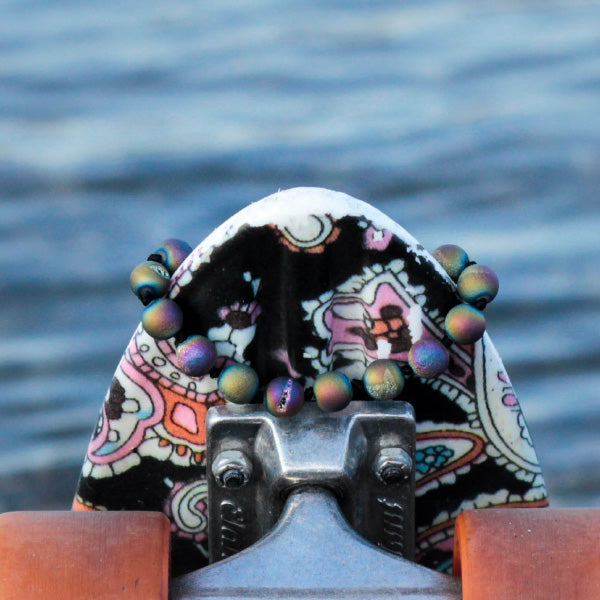How to Reduce Waste in School
How can you avoid the rubbish at school? A lot of garbage accumulates at school every day - plastic packaging, paper bags, pens and other trash. The zero-waste lifestyle starts at school. So that we can keep the environment clean in the future, something urgently needs to change here too. Therefore, in this article and its following two parts, we will show you the best tips for avoiding waste at school.
Overview
- Buy old books instead of new ones
- Lunch box instead of paper bag
- Reusable water bottle
- Label both sides
- Beeswax cloths instead of cling film
- Recycled exercise books instead of a new paper
- Use flat cardboard files
- Environmentally friendly material in a case
- Newspaper for binding books and notebooks
- Big packages instead of small ones
- Use up your old inventory
- Avoid the snacks from a machine
- Educate children - collect rubbish at school

1. Buy old books instead of new ones
You have to buy some books at school. Instead of buying a new book, buy someone an old copy. Many students sell their old books after they no longer need them. Should you not find anything in your area, take a look at rebuy! In addition to protecting the environment, you also save a lot of money.
2. Lunch box instead of paper bag
The first step to avoiding waste at school is to use a stainless steel lunch box. By using a lunch box, some garbage can be saved at school. A plastic-free lunch box made of stainless steel or pressed rice husks is best suited.
But a reusable plastic lunch box is still a much better choice than the paper bags that come back every day. With a lunch box, which contains several compartments, bread, fruit and other snacks can be divided easily.
3. Reusable water bottle
To avoid waste at school, a reusable water bottle is also essential. A stainless steel bottle is also suitable here. The drinks stay nice and cool in summer and warm in winter. Alternatively, you can reuse an old glass bottle. Using a drinking bottle also saves having to lug around and return the deposit bottles in the supermarket.
4. Label both sides
You can save a lot of paper waste by writing on both sides of a sheet of paper. This is especially useful if you are using a college block. You can also keep old sheets of paper and use them later as note sheets.
5. Beeswax cloths instead of cling film
Beeswax towels are an excellent alternative to conventional cling film. They consist of natural raw materials and have a long lifespan. They can also be easily washed off with water. They are flexible, light and easy to transport.
Have a look how to use it:
6. Recycled exercise books instead of a new paper
By using exercise books, a lot of writing and plastic is used every year. So it's worth taking the recycled exercise books. Notebooks with light grey leaves are best. These booklets are unbleached and therefore particularly suitable for the environment. When buying college blocks, you can also look for recycled, slightly greyish paper. In the article Saving paper, you will get more great tips to avoid further paper waste.
7. Use flat cardboard files
Loose-leaf binders are handy, but unfortunately, mostly consist of plastic. However, there is a practical cardboard alternative. Cardboard flat files are just as stable as conventional flat files, but are significantly more environmentally friendly.
8. Environmentally friendly material in a case
You can replace much of what fits in the case with plastic-free items. For example, you can use a wooden ruler and a metal sharpener. With erasers, you should make sure that they are PCV-free because PVC contains plasticizers that are very bad for the environment. You can recognize this because they use labels such as "Pro Natur" or "PCV-free". You can also make sure that fountain pens and ballpoint pens are refillable. So you can do without the garbage at least a little.
9. Newspaper for binding books and notebooks
Do you still have old newspapers lying around at home? Then don't throw them away! Many like to use plastic sleeves to bind books and paper notebooks. However, the newspaper works just as well. The newspaper also ensures that paper notebooks and books stay clean and dog-eared. You can also use a newsprint for plastic-free wrapping of gifts.
10. Big packages instead of small ones
When shopping for snacks for school, one should pay attention to the packaging. If plastic packaging cannot be avoided, you should make sure to use the more extensive packaging, if possible. Larger quantities of food, such as yogurt, can be filled into jars and taken to school. To avoid plastic packaging altogether, it is worth looking at unpackaged shops or the weekly market in your city. There you can find it easier to shop without packaging. In the article Plastic-free shopping - It's that easy! You will get even more tips for plastic-free shopping.
11. Use up your old inventory
Before you go to the next store and buy new, environmentally friendly alternatives, you should first use up your old stock because even ecologically friendly materials such as wood are still limited resources. If you can't wait, you still have the option to give away your old inventory. This saves someone else the purchase of new resources, and you can start right away with environmentally friendly alternatives.
12. Avoid the snacks from a machine
In school cafeterias, there are mostly machines with snacks and drinks. However, the snacks are always wrapped in plastic; the drinks are filled in plastic bottles. Instead of buying a snack from the vending machine during the break, it's better to pack a little more food. The same goes for the drinks. But maybe you'll be able to convince the school to use glass bottles instead of plastic bottles?
13. Educate children - collect rubbish at school
Children are mostly not yet aware of the impact of garbage on our planet. However, many schools are already running projects on the subject of plastic recycling and plastic waste in the environment to educate the students. The recycling system is playfully explained to the children in the projects. They are also informed about the pollution of the earth. Once they understand the problem, many children are very compassionate. Avoiding waste in school is the first important step in creating a pleasant learning atmosphere. Nevertheless, despite all the possible tricks, trash will accumulate in the school.
So-called "garbage collection days" can help to reduce the amount of garbage on the school premises. These days, school classes collect the rubbish lying around on the floor and other surfaces together. If no such project is taking place at your child's school, bring it up at the next parents' meeting. Please feel free to join global CleanUp Communities on Facebook, where people from all over the world are committed to a cleaner environment.
Avoiding waste at school made easy
As you can see, reducing the junk in the classrooms is easy. With the right awareness of the environment, we can keep schools, universities, and offices, and other facilities clean. Even if the first steps towards environmental protection in schools have already been taken, there is still a long way to go. It is all the more vital that we tackle the problem instead of looking the other way.
We hope the tips were helpful to you. What is your opinion on the subject? Do you know any more tips for avoiding waste at school? Then leave us your opinion under this post.
Leave a comment
Comments will be approved before showing up.
















